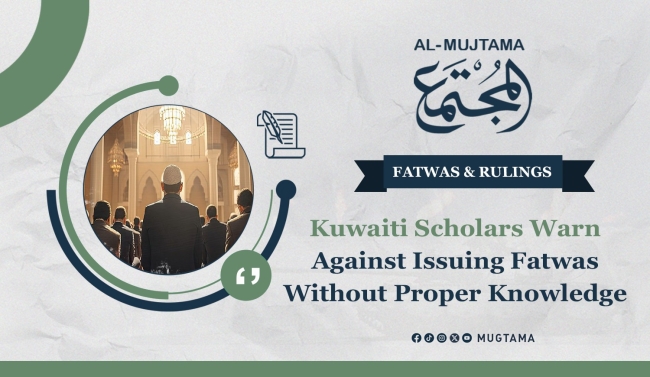Kuwaiti Scholars Warn against Issuing Fatwas Without Proper Knowledge
Issuing fatwas is a precise and significant responsibility that requires extensive knowledge and a deep understanding of Islamic Sharia. The Prophet Muhammad (peace be upon him) warned against taking it lightly, saying, “The most reckless of you in issuing fatwas is verging to enter Hell-fire.” This warning indicates that issuing fatwas without sufficient knowledge can lead to severe consequences.
In our current era, some people observe the spread of fatwas from individuals lacking the necessary qualifications, where some assume the right to issue fatwas merely because they have memorized some Quranic ayahs or have a superficial understanding of the Sunnah. This situation raises important questions about the eligibility of these individuals to issue fatwas and the impact this has on society.
In this context, we will present the opinions of some scholars of Islamic Sharia who clarify the conditions and regulations that must be met by a mufti and the importance of referring to specialized scholars to avoid unqualified fatwas that may mislead and harm people.
Initially, Dr. Ajil Al-Nashmi, former Dean of the College of Sharia, member of the International Islamic Fiqh Academy, warned Al-Mujtama: against allowing anyone with a superficial knowledge of Islamic sciences to issue fatwas. He emphasized that a mufti must be qualified, reputable, and widely knowledgeable in Islamic sciences, capable of analyzing Sharia evidence and distinguishing between the predominant and weaker opinions, with a good understanding of the context in which the questions are posed.
Dr. Al-Nashmi explained that fatwas are divided into two types:
- Individual fatwas concerning matters of permissible and forbidden in family and marital relations. For these, local muftis in each country suffice, as differences in opinion are acceptable, and the views of local muftis are sufficient.
- Complex contemporary issues such as medical, economic, and banking matters. These require two types of fatwa bodies: first, specialized institutions, especially economic ones; second, comprehensive Fiqh councils that gather multiple opinions on a single issue to enrich the discussion and reach a consensus opinion agreed upon by the majority. Participants in these councils must be well-established scholars without external influences, whether political or otherwise. The International Islamic Fiqh Academy is considered a successful example in this regard.
Dr. Al-Nashmi stressed the seriousness of issuing fatwas, as they involve revealing Allah's judgment on new incidents or issues. Therefore, those who are unqualified or have superficial knowledge of Islamic sciences should not undertake this task, as deriving rulings requires familiarity with the tools and methods for extracting judgments from detailed evidence, i.e., the Quran and the prophetic Sunnah.
Dr. Khaled Al-Mathkour, head of the Fatwa Committee in the Ministry of Awqaf, stated that Islam warned against following the opinions of those who are not academically qualified, as they mislead themselves and others. The Prophet (peace be upon him) said: “God does not take away knowledge by removing it from men, but takes it away by taking away the learned, so that when He leaves no learned man, men will take ignorant men as leaders. Causes will be presented to them and they will pass judgement without knowledge, erring and leading others into error.” Those who issue fatwas without knowledge can cause the loss of lives, property, and honor. The Prophet (peace be upon him) said: “If anyone gives a fatwa ignorantly it’s as if he has been slaughtered without a knife.”
Dr. Al-Mathkour emphasized that scholars and preachers, when faced with fatwas that cause confusion and discord, should refer to official Fiqh councils or accredited Fatwa committees, as these bodies bear the responsibility if a fatwa is incorrect. He warned of the dangers of issuing fatwas without knowledge, stating that it leads to serious problems, and that an ignorant mufti should be prevented from issuing fatwas to avoid influencing people with weak or ignorant opinions.
Dr. Al-Mathkour confirmed that issuing fatwas is not an easy task and that scholars aware of its dangers avoid it out of caution and fear of the consequences. He explained that jurists have established general conditions for those who undertake issuing fatwas, including being knowledgeable in the principles of jurisprudence, familiar with the juristic efforts and evidence of other scholars, aware of abrogating and abrogated texts, the predominant and weaker opinions, and proficient in the rules of the Arabic language, including grammar, morphology, and rhetoric.
Dr. Al-Mathkour called for the importance of collective ijtihad (independent reasoning) and avoiding individual ijtihad as much as possible, especially in vital issues concerning the Muslim Ummah. These issues should be studied by a large number of jurists and scholars to issue a collective fatwa on them, as collective ijtihad combines several qualities not found in individual ijtihad. Many studies are written, undergo lengthy discussions, and some opinions may be preferred as a result of these discussions. Then, decisions and recommendations are issued based on what scholars have reached, making them strong, coordinated, and considerate of the interests of the Muslim Ummah.
-------------------------------------------------------------


